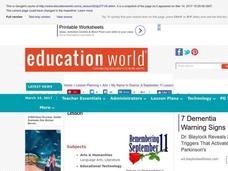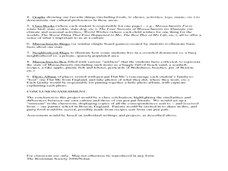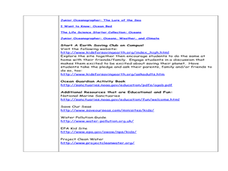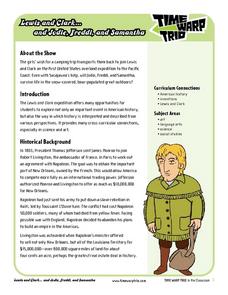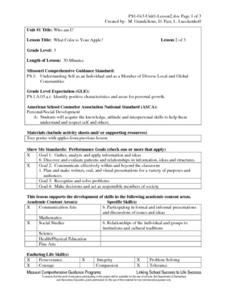Curated OER
Indian Basket Weaving
Students explore Indian Basket designs, experiment with weaving materials and create their own baskets in this 5-day Arrt lesson for the early-elementary classroom. The lesson includes scoring guides and illustrated directions for students.
Curated OER
Add and Subtract with Hudson River shipping
Rivers aren't just a place for animals to live, they also provide industrial transportation. The class will examine the Hudson River on a map, discuss all the commercial vessels that use the River to transport materials, then complete a...
Curated OER
My Name Is Osama
Students read a short story about a young Iraqi boy, which opens up classroom discussion about the difficulties some immigrant students face, especially in the days after September 11.
Curated OER
The Journey of Sacagawea
Students examine the life of Sacagawea, the exceptional woman chosen to appear on the Golden Dollar, and write journal entries based on their research.
Curated OER
KWL on flags
Third graders engage in a writing activity in order to research and establish meaning for the subject of the American Flag. They use a graphic organizer known as a KWL Chart in order to progress through the lesson.
Curated OER
What Does a Nonprofit Do, and for Whom?
Students investigate key local and national nonprofit organizations by researching their histories, services, and target populations. Student pairs present their information to the rest of the class. Each student will be responsible for...
Curated OER
Love Letters to the World
Young scholars compare three service projects and decide on one to carry out in their community. They determine the opportunity costs of completing one project over another and vote for the one they want to complete. Students realize how...
Curated OER
Learning About Animal Shelters for Earth Day
Students explore habitats. in this ecology and animal habitat lesson, students listen to the book A House is a House for Me by Mary Ann Hoberman. Students discuss the basic needs of animals and go on a nature walk to observe animal...
Curated OER
Save the Animals!
Students research an endangered animal and share what they learned through the use of technology. In this interdisciplinary lesson on animals, students conduct research on an endangered animal. Then, students create a PowerPoint...
Curated OER
Life Along the Trail
Students explore the significance of the Louisiana Purchase and the journey of Lewis and Clark's Corps of Discovery. They read to explain a new topic and write to inform readers of the historic events they explored.
Curated OER
Money and Business (Art)
Third graders investigate world currency by creating their own coin art. In this government activity, 3rd graders examine the characteristics of different coins and create their own design for a new one. Students discuss and...
Curated OER
Inch By Inch
Learners explore the concept of measuring length using a one-inch pipe cleaner "inchworm." They listen to the story "Inch By Inch by Leo Lionni and discuss how the animals were measured by the inchworm in the book. In pairs students...
Curated OER
Out of Old England in the 1630s-Flat Me Project
Learners write letters to penpals. In this geography/literacy lesson, students become penpals with a classroom in England to learn about customs and society across the ocean. Flat Stanley by Will Holton is read aloud, and learners...
Curated OER
Flag Day Vocabulary Quiz
In this recognizing Flag Day terminology learning exercise, students match the vocabulary words with their definitions. Students match 15 answers.
Curated OER
I Can Preserve My Planet
Students explore renewable and nonrenewable resources. In this ocean preservation lesson, students use KWL charts to understand ways the ocean is important to our daily lives. Students create a poster or wirte a letter to someone...
Curated OER
Pair the Plants: An Introduction to Scientific Names
Learners examine why plants have both common and scientific names, then complete the activity by matching each common plant name with its scientific name. They finish by working in cooperative groups to create an ABC of Plants class book.
Curated OER
Geometry of Democracy
Learners explore the architecture of New England by identifying geometric shapes. In this architectural lesson, students examine photographs of classic building architecture and use a transparency to trace geometric shapes they...
Curated OER
Lewis and clark...and Jodie, Freddi, and Samantha
Students practice descriptive language when one student describes an object to another student who cannot see it. They guess what the object is and relate the experience to that of the Lewis and Clark expeditionary journals.
Curated OER
What Color Is Your Apple?
Third graders spend time identifying the characteristics they have and ones they would like to develop for their own personal growth. As a class, they brainstorm ways they can tell they are growing up or being mature. Individually, they...
Curated OER
Huguenot Street
Third graders visit Early Huguenot Street and identify architectural structural and design elements that were in use before 1720. They consider how architecture has evolved and complete Venn diagrams with their observations.
Curated OER
Can Young Children Distinguish Between Living and Non-living Things?
What does it mean to be living? Help your young scientists identify living and non-living things as a result of their learning through discovery. Observation of and interaction with a set of natural phenomena in their community will make...
Curated OER
Rosa Parks
Students explore the life and works of Rosa Parks. In this Civil Rights lesson, students consider Rosa Parks' work as a philanthropist. Students then write a letter to someone that they admire for making a difference.
Curated OER
Publishing With Photos!
Students create books with photographs as illustrations. In this book making lesson, students create books for different subjects to accompany what they are learning. They take photographs to match what they have written.
Curated OER
Literacy: Each One Teach One
Students read the book, Amber on the Mountain and discuss its philanthropic implications. They determine the literacy needs of their own communities. They ask family members to complete reading recollection forms about when and how they...


